Leadership and Management for Service Industries
VerifiedAdded on 2023/06/08
|15
|4708
|161
AI Summary
This report explores the role of leadership and management in service industries, with a focus on crisis management, leadership styles, and internal and external factors that affect leadership. It includes a review of Ynyshir Restaurant's management and leadership practices, as well as a critical view of changes in management styles. The report also discusses the current and future management and leadership skills required in the service sector, and the impact of crisis management and leadership skills during the pandemic. Finally, it examines different service industry organisations' crisis management systems and leadership in implementing change using one established change management model.
Contribute Materials
Your contribution can guide someone’s learning journey. Share your
documents today.
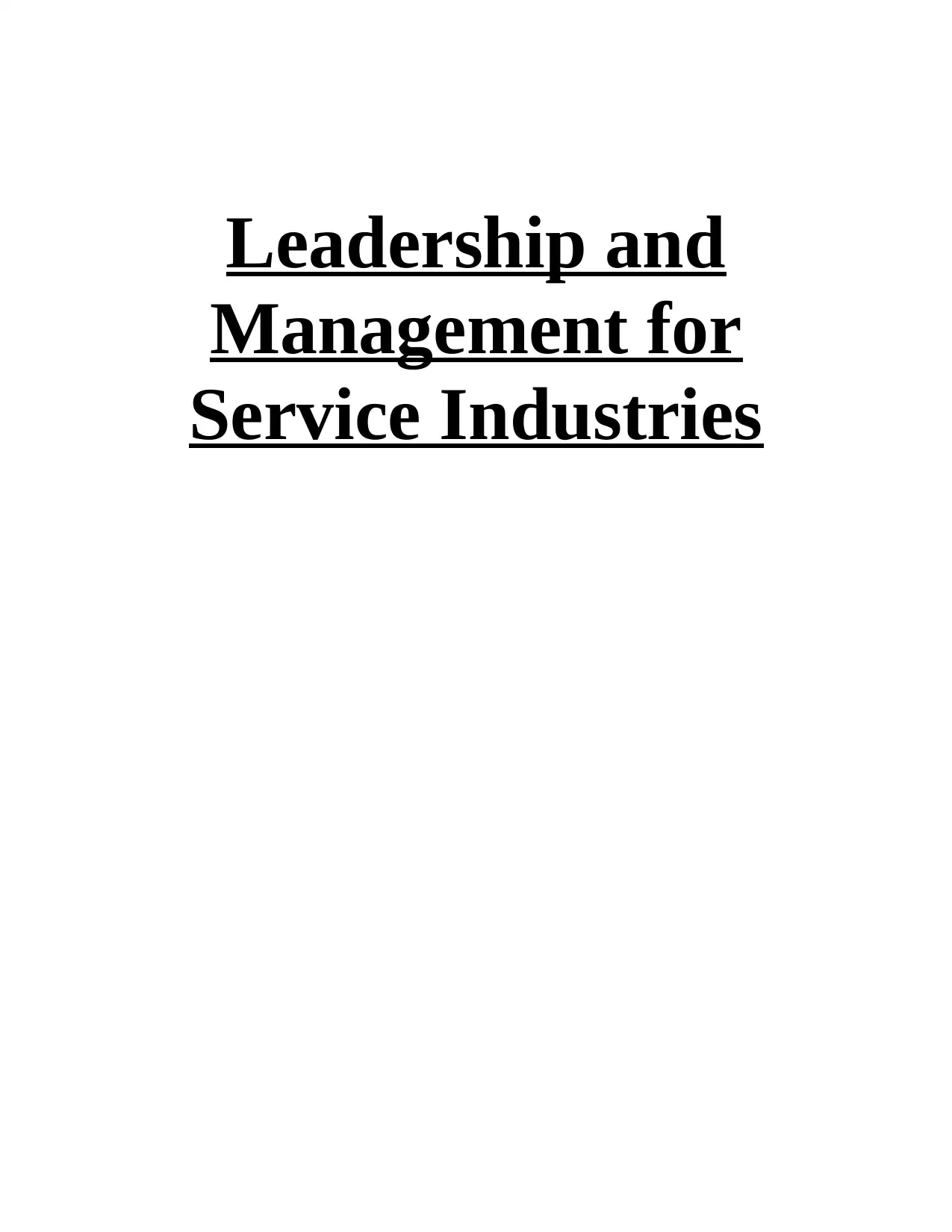
Leadership and
Management for
Service Industries
Management for
Service Industries
Secure Best Marks with AI Grader
Need help grading? Try our AI Grader for instant feedback on your assignments.
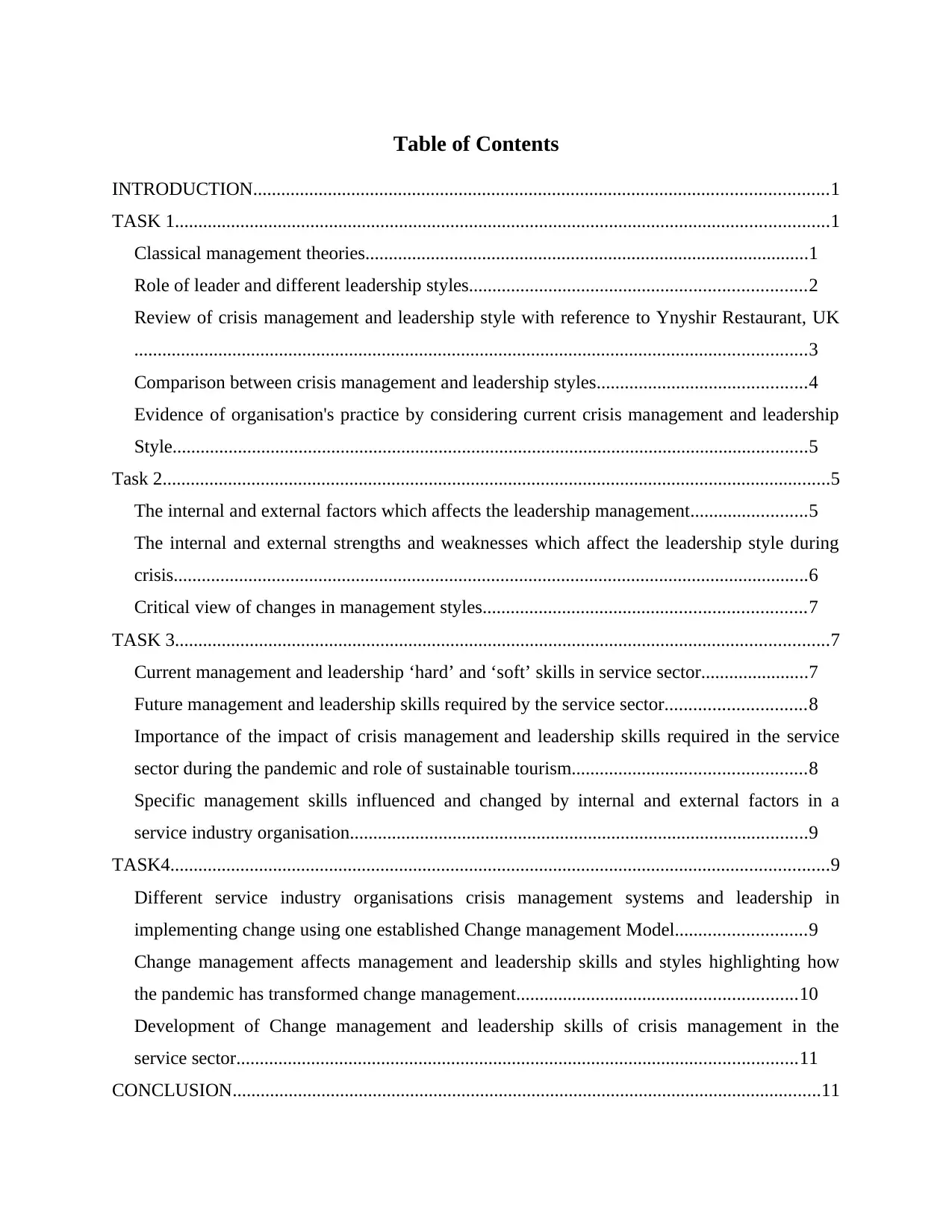
Table of Contents
INTRODUCTION...........................................................................................................................1
TASK 1............................................................................................................................................1
Classical management theories...............................................................................................1
Role of leader and different leadership styles........................................................................2
Review of crisis management and leadership style with reference to Ynyshir Restaurant, UK
................................................................................................................................................3
Comparison between crisis management and leadership styles.............................................4
Evidence of organisation's practice by considering current crisis management and leadership
Style........................................................................................................................................5
Task 2...............................................................................................................................................5
The internal and external factors which affects the leadership management.........................5
The internal and external strengths and weaknesses which affect the leadership style during
crisis........................................................................................................................................6
Critical view of changes in management styles.....................................................................7
TASK 3............................................................................................................................................7
Current management and leadership ‘hard’ and ‘soft’ skills in service sector.......................7
Future management and leadership skills required by the service sector..............................8
Importance of the impact of crisis management and leadership skills required in the service
sector during the pandemic and role of sustainable tourism..................................................8
Specific management skills influenced and changed by internal and external factors in a
service industry organisation..................................................................................................9
TASK4.............................................................................................................................................9
Different service industry organisations crisis management systems and leadership in
implementing change using one established Change management Model............................9
Change management affects management and leadership skills and styles highlighting how
the pandemic has transformed change management............................................................10
Development of Change management and leadership skills of crisis management in the
service sector........................................................................................................................11
CONCLUSION..............................................................................................................................11
INTRODUCTION...........................................................................................................................1
TASK 1............................................................................................................................................1
Classical management theories...............................................................................................1
Role of leader and different leadership styles........................................................................2
Review of crisis management and leadership style with reference to Ynyshir Restaurant, UK
................................................................................................................................................3
Comparison between crisis management and leadership styles.............................................4
Evidence of organisation's practice by considering current crisis management and leadership
Style........................................................................................................................................5
Task 2...............................................................................................................................................5
The internal and external factors which affects the leadership management.........................5
The internal and external strengths and weaknesses which affect the leadership style during
crisis........................................................................................................................................6
Critical view of changes in management styles.....................................................................7
TASK 3............................................................................................................................................7
Current management and leadership ‘hard’ and ‘soft’ skills in service sector.......................7
Future management and leadership skills required by the service sector..............................8
Importance of the impact of crisis management and leadership skills required in the service
sector during the pandemic and role of sustainable tourism..................................................8
Specific management skills influenced and changed by internal and external factors in a
service industry organisation..................................................................................................9
TASK4.............................................................................................................................................9
Different service industry organisations crisis management systems and leadership in
implementing change using one established Change management Model............................9
Change management affects management and leadership skills and styles highlighting how
the pandemic has transformed change management............................................................10
Development of Change management and leadership skills of crisis management in the
service sector........................................................................................................................11
CONCLUSION..............................................................................................................................11

REFERENCES..............................................................................................................................12
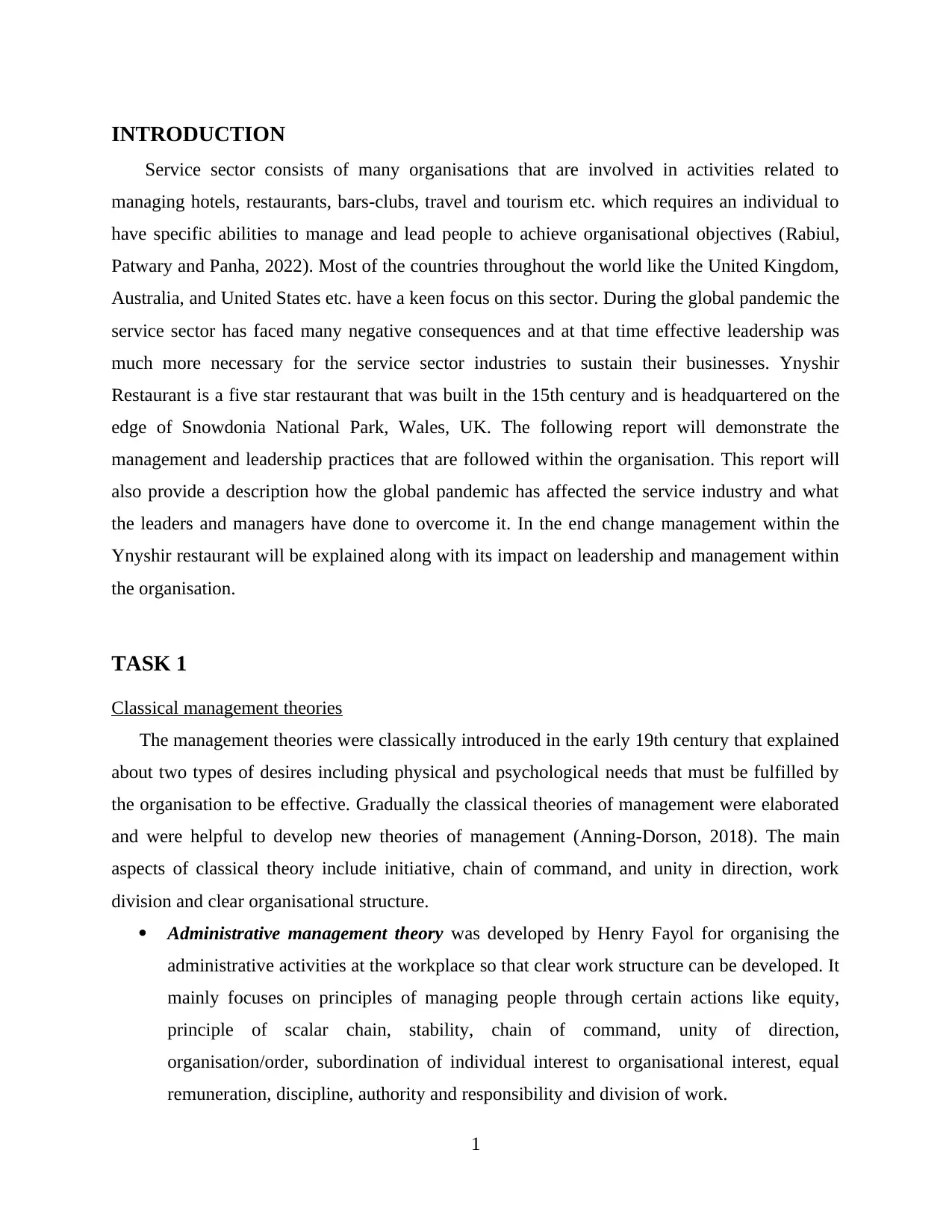
INTRODUCTION
Service sector consists of many organisations that are involved in activities related to
managing hotels, restaurants, bars-clubs, travel and tourism etc. which requires an individual to
have specific abilities to manage and lead people to achieve organisational objectives (Rabiul,
Patwary and Panha, 2022). Most of the countries throughout the world like the United Kingdom,
Australia, and United States etc. have a keen focus on this sector. During the global pandemic the
service sector has faced many negative consequences and at that time effective leadership was
much more necessary for the service sector industries to sustain their businesses. Ynyshir
Restaurant is a five star restaurant that was built in the 15th century and is headquartered on the
edge of Snowdonia National Park, Wales, UK. The following report will demonstrate the
management and leadership practices that are followed within the organisation. This report will
also provide a description how the global pandemic has affected the service industry and what
the leaders and managers have done to overcome it. In the end change management within the
Ynyshir restaurant will be explained along with its impact on leadership and management within
the organisation.
TASK 1
Classical management theories
The management theories were classically introduced in the early 19th century that explained
about two types of desires including physical and psychological needs that must be fulfilled by
the organisation to be effective. Gradually the classical theories of management were elaborated
and were helpful to develop new theories of management (Anning-Dorson, 2018). The main
aspects of classical theory include initiative, chain of command, and unity in direction, work
division and clear organisational structure.
Administrative management theory was developed by Henry Fayol for organising the
administrative activities at the workplace so that clear work structure can be developed. It
mainly focuses on principles of managing people through certain actions like equity,
principle of scalar chain, stability, chain of command, unity of direction,
organisation/order, subordination of individual interest to organisational interest, equal
remuneration, discipline, authority and responsibility and division of work.
1
Service sector consists of many organisations that are involved in activities related to
managing hotels, restaurants, bars-clubs, travel and tourism etc. which requires an individual to
have specific abilities to manage and lead people to achieve organisational objectives (Rabiul,
Patwary and Panha, 2022). Most of the countries throughout the world like the United Kingdom,
Australia, and United States etc. have a keen focus on this sector. During the global pandemic the
service sector has faced many negative consequences and at that time effective leadership was
much more necessary for the service sector industries to sustain their businesses. Ynyshir
Restaurant is a five star restaurant that was built in the 15th century and is headquartered on the
edge of Snowdonia National Park, Wales, UK. The following report will demonstrate the
management and leadership practices that are followed within the organisation. This report will
also provide a description how the global pandemic has affected the service industry and what
the leaders and managers have done to overcome it. In the end change management within the
Ynyshir restaurant will be explained along with its impact on leadership and management within
the organisation.
TASK 1
Classical management theories
The management theories were classically introduced in the early 19th century that explained
about two types of desires including physical and psychological needs that must be fulfilled by
the organisation to be effective. Gradually the classical theories of management were elaborated
and were helpful to develop new theories of management (Anning-Dorson, 2018). The main
aspects of classical theory include initiative, chain of command, and unity in direction, work
division and clear organisational structure.
Administrative management theory was developed by Henry Fayol for organising the
administrative activities at the workplace so that clear work structure can be developed. It
mainly focuses on principles of managing people through certain actions like equity,
principle of scalar chain, stability, chain of command, unity of direction,
organisation/order, subordination of individual interest to organisational interest, equal
remuneration, discipline, authority and responsibility and division of work.
1
Secure Best Marks with AI Grader
Need help grading? Try our AI Grader for instant feedback on your assignments.
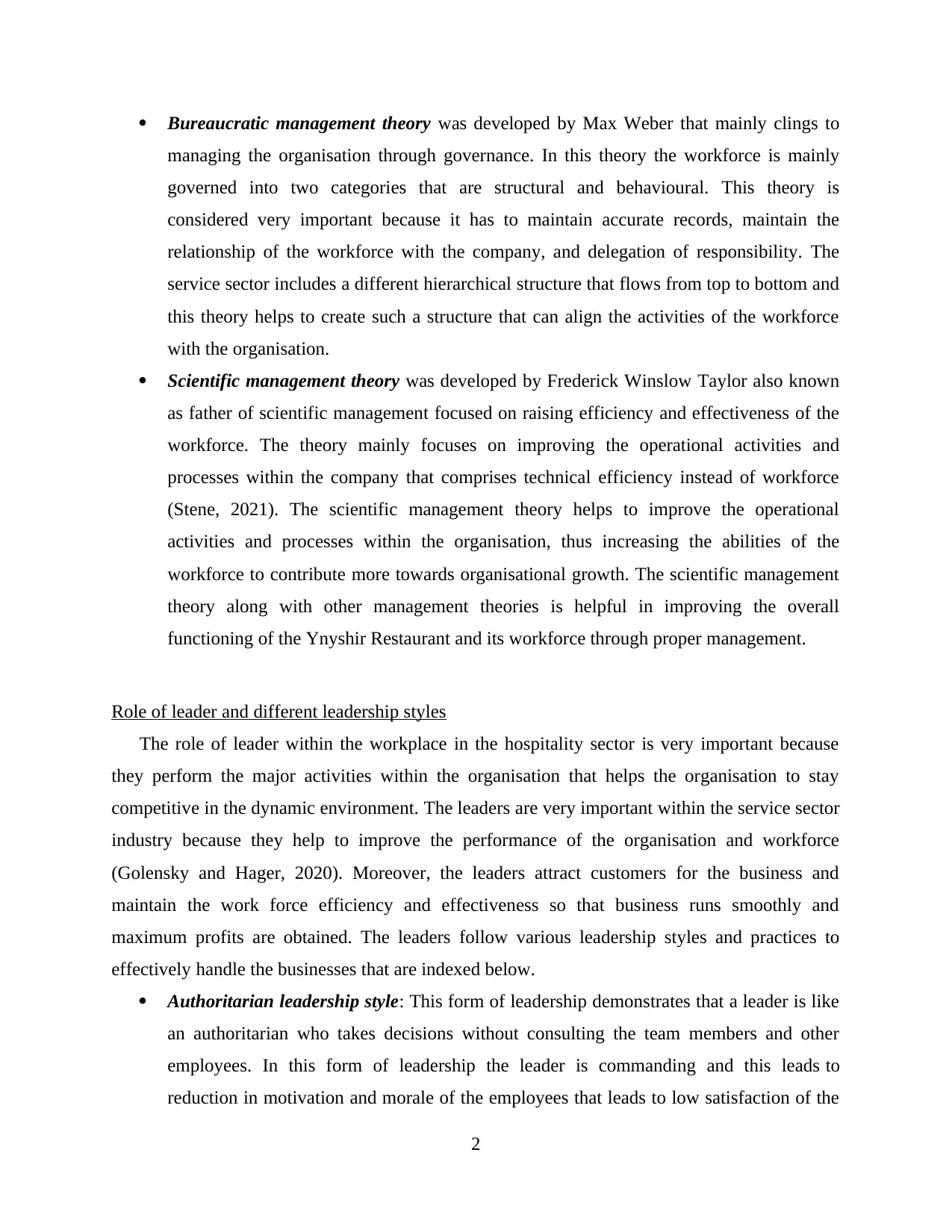
Bureaucratic management theory was developed by Max Weber that mainly clings to
managing the organisation through governance. In this theory the workforce is mainly
governed into two categories that are structural and behavioural. This theory is
considered very important because it has to maintain accurate records, maintain the
relationship of the workforce with the company, and delegation of responsibility. The
service sector includes a different hierarchical structure that flows from top to bottom and
this theory helps to create such a structure that can align the activities of the workforce
with the organisation.
Scientific management theory was developed by Frederick Winslow Taylor also known
as father of scientific management focused on raising efficiency and effectiveness of the
workforce. The theory mainly focuses on improving the operational activities and
processes within the company that comprises technical efficiency instead of workforce
(Stene, 2021). The scientific management theory helps to improve the operational
activities and processes within the organisation, thus increasing the abilities of the
workforce to contribute more towards organisational growth. The scientific management
theory along with other management theories is helpful in improving the overall
functioning of the Ynyshir Restaurant and its workforce through proper management.
Role of leader and different leadership styles
The role of leader within the workplace in the hospitality sector is very important because
they perform the major activities within the organisation that helps the organisation to stay
competitive in the dynamic environment. The leaders are very important within the service sector
industry because they help to improve the performance of the organisation and workforce
(Golensky and Hager, 2020). Moreover, the leaders attract customers for the business and
maintain the work force efficiency and effectiveness so that business runs smoothly and
maximum profits are obtained. The leaders follow various leadership styles and practices to
effectively handle the businesses that are indexed below.
Authoritarian leadership style: This form of leadership demonstrates that a leader is like
an authoritarian who takes decisions without consulting the team members and other
employees. In this form of leadership the leader is commanding and this leads to
reduction in motivation and morale of the employees that leads to low satisfaction of the
2
managing the organisation through governance. In this theory the workforce is mainly
governed into two categories that are structural and behavioural. This theory is
considered very important because it has to maintain accurate records, maintain the
relationship of the workforce with the company, and delegation of responsibility. The
service sector includes a different hierarchical structure that flows from top to bottom and
this theory helps to create such a structure that can align the activities of the workforce
with the organisation.
Scientific management theory was developed by Frederick Winslow Taylor also known
as father of scientific management focused on raising efficiency and effectiveness of the
workforce. The theory mainly focuses on improving the operational activities and
processes within the company that comprises technical efficiency instead of workforce
(Stene, 2021). The scientific management theory helps to improve the operational
activities and processes within the organisation, thus increasing the abilities of the
workforce to contribute more towards organisational growth. The scientific management
theory along with other management theories is helpful in improving the overall
functioning of the Ynyshir Restaurant and its workforce through proper management.
Role of leader and different leadership styles
The role of leader within the workplace in the hospitality sector is very important because
they perform the major activities within the organisation that helps the organisation to stay
competitive in the dynamic environment. The leaders are very important within the service sector
industry because they help to improve the performance of the organisation and workforce
(Golensky and Hager, 2020). Moreover, the leaders attract customers for the business and
maintain the work force efficiency and effectiveness so that business runs smoothly and
maximum profits are obtained. The leaders follow various leadership styles and practices to
effectively handle the businesses that are indexed below.
Authoritarian leadership style: This form of leadership demonstrates that a leader is like
an authoritarian who takes decisions without consulting the team members and other
employees. In this form of leadership the leader is commanding and this leads to
reduction in motivation and morale of the employees that leads to low satisfaction of the
2
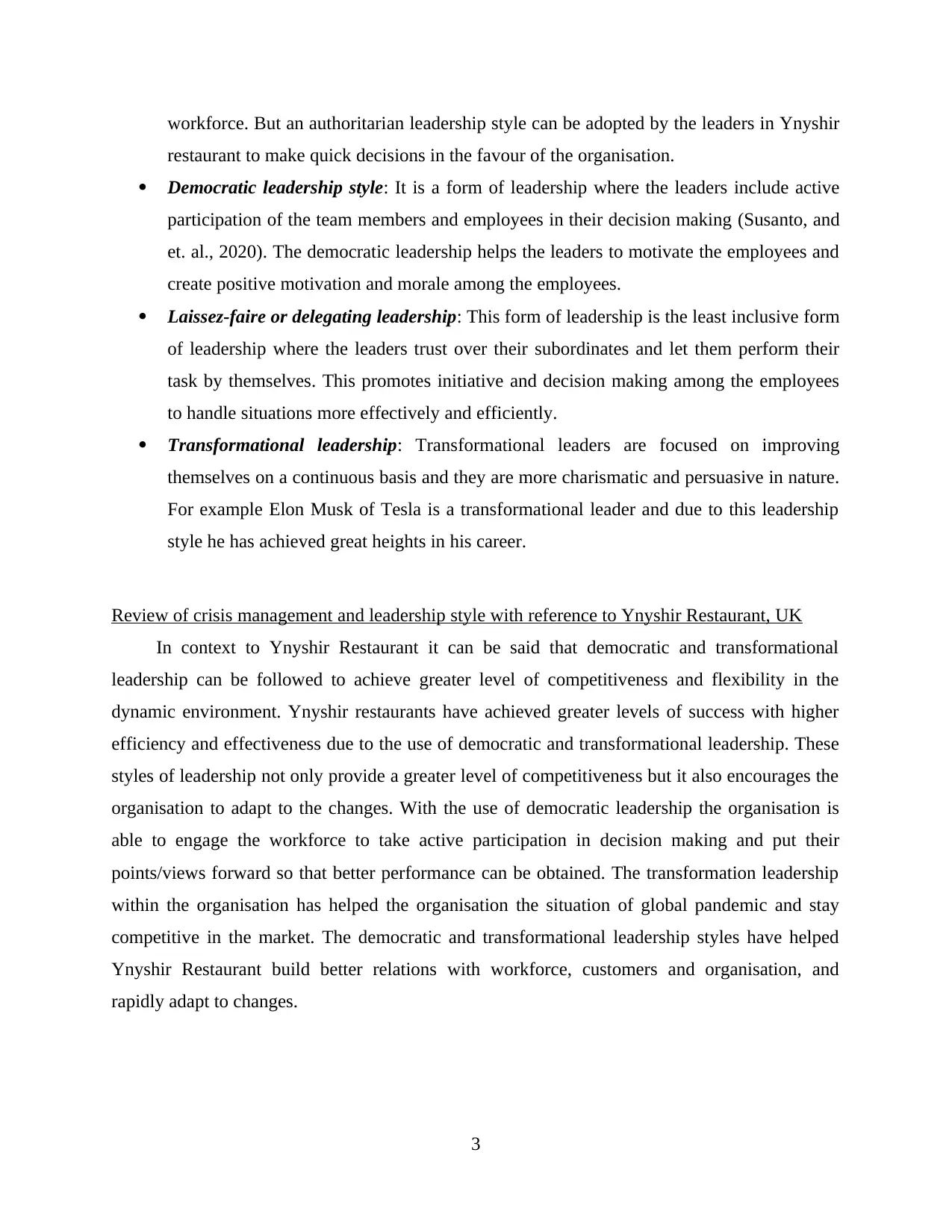
workforce. But an authoritarian leadership style can be adopted by the leaders in Ynyshir
restaurant to make quick decisions in the favour of the organisation.
Democratic leadership style: It is a form of leadership where the leaders include active
participation of the team members and employees in their decision making (Susanto, and
et. al., 2020). The democratic leadership helps the leaders to motivate the employees and
create positive motivation and morale among the employees.
Laissez-faire or delegating leadership: This form of leadership is the least inclusive form
of leadership where the leaders trust over their subordinates and let them perform their
task by themselves. This promotes initiative and decision making among the employees
to handle situations more effectively and efficiently.
Transformational leadership: Transformational leaders are focused on improving
themselves on a continuous basis and they are more charismatic and persuasive in nature.
For example Elon Musk of Tesla is a transformational leader and due to this leadership
style he has achieved great heights in his career.
Review of crisis management and leadership style with reference to Ynyshir Restaurant, UK
In context to Ynyshir Restaurant it can be said that democratic and transformational
leadership can be followed to achieve greater level of competitiveness and flexibility in the
dynamic environment. Ynyshir restaurants have achieved greater levels of success with higher
efficiency and effectiveness due to the use of democratic and transformational leadership. These
styles of leadership not only provide a greater level of competitiveness but it also encourages the
organisation to adapt to the changes. With the use of democratic leadership the organisation is
able to engage the workforce to take active participation in decision making and put their
points/views forward so that better performance can be obtained. The transformation leadership
within the organisation has helped the organisation the situation of global pandemic and stay
competitive in the market. The democratic and transformational leadership styles have helped
Ynyshir Restaurant build better relations with workforce, customers and organisation, and
rapidly adapt to changes.
3
restaurant to make quick decisions in the favour of the organisation.
Democratic leadership style: It is a form of leadership where the leaders include active
participation of the team members and employees in their decision making (Susanto, and
et. al., 2020). The democratic leadership helps the leaders to motivate the employees and
create positive motivation and morale among the employees.
Laissez-faire or delegating leadership: This form of leadership is the least inclusive form
of leadership where the leaders trust over their subordinates and let them perform their
task by themselves. This promotes initiative and decision making among the employees
to handle situations more effectively and efficiently.
Transformational leadership: Transformational leaders are focused on improving
themselves on a continuous basis and they are more charismatic and persuasive in nature.
For example Elon Musk of Tesla is a transformational leader and due to this leadership
style he has achieved great heights in his career.
Review of crisis management and leadership style with reference to Ynyshir Restaurant, UK
In context to Ynyshir Restaurant it can be said that democratic and transformational
leadership can be followed to achieve greater level of competitiveness and flexibility in the
dynamic environment. Ynyshir restaurants have achieved greater levels of success with higher
efficiency and effectiveness due to the use of democratic and transformational leadership. These
styles of leadership not only provide a greater level of competitiveness but it also encourages the
organisation to adapt to the changes. With the use of democratic leadership the organisation is
able to engage the workforce to take active participation in decision making and put their
points/views forward so that better performance can be obtained. The transformation leadership
within the organisation has helped the organisation the situation of global pandemic and stay
competitive in the market. The democratic and transformational leadership styles have helped
Ynyshir Restaurant build better relations with workforce, customers and organisation, and
rapidly adapt to changes.
3
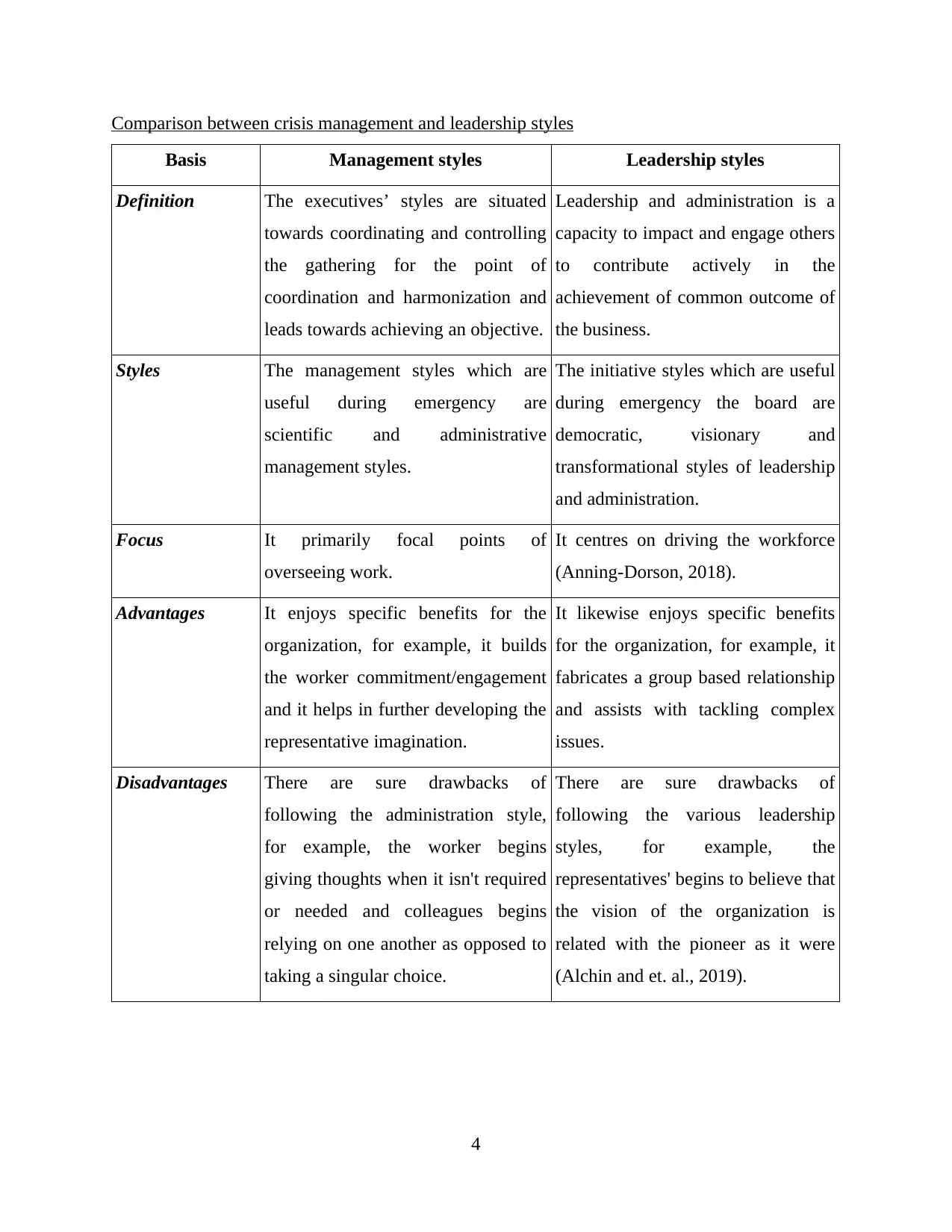
Comparison between crisis management and leadership styles
Basis Management styles Leadership styles
Definition The executives’ styles are situated
towards coordinating and controlling
the gathering for the point of
coordination and harmonization and
leads towards achieving an objective.
Leadership and administration is a
capacity to impact and engage others
to contribute actively in the
achievement of common outcome of
the business.
Styles The management styles which are
useful during emergency are
scientific and administrative
management styles.
The initiative styles which are useful
during emergency the board are
democratic, visionary and
transformational styles of leadership
and administration.
Focus It primarily focal points of
overseeing work.
It centres on driving the workforce
(Anning-Dorson, 2018).
Advantages It enjoys specific benefits for the
organization, for example, it builds
the worker commitment/engagement
and it helps in further developing the
representative imagination.
It likewise enjoys specific benefits
for the organization, for example, it
fabricates a group based relationship
and assists with tackling complex
issues.
Disadvantages There are sure drawbacks of
following the administration style,
for example, the worker begins
giving thoughts when it isn't required
or needed and colleagues begins
relying on one another as opposed to
taking a singular choice.
There are sure drawbacks of
following the various leadership
styles, for example, the
representatives' begins to believe that
the vision of the organization is
related with the pioneer as it were
(Alchin and et. al., 2019).
4
Basis Management styles Leadership styles
Definition The executives’ styles are situated
towards coordinating and controlling
the gathering for the point of
coordination and harmonization and
leads towards achieving an objective.
Leadership and administration is a
capacity to impact and engage others
to contribute actively in the
achievement of common outcome of
the business.
Styles The management styles which are
useful during emergency are
scientific and administrative
management styles.
The initiative styles which are useful
during emergency the board are
democratic, visionary and
transformational styles of leadership
and administration.
Focus It primarily focal points of
overseeing work.
It centres on driving the workforce
(Anning-Dorson, 2018).
Advantages It enjoys specific benefits for the
organization, for example, it builds
the worker commitment/engagement
and it helps in further developing the
representative imagination.
It likewise enjoys specific benefits
for the organization, for example, it
fabricates a group based relationship
and assists with tackling complex
issues.
Disadvantages There are sure drawbacks of
following the administration style,
for example, the worker begins
giving thoughts when it isn't required
or needed and colleagues begins
relying on one another as opposed to
taking a singular choice.
There are sure drawbacks of
following the various leadership
styles, for example, the
representatives' begins to believe that
the vision of the organization is
related with the pioneer as it were
(Alchin and et. al., 2019).
4
Paraphrase This Document
Need a fresh take? Get an instant paraphrase of this document with our AI Paraphraser
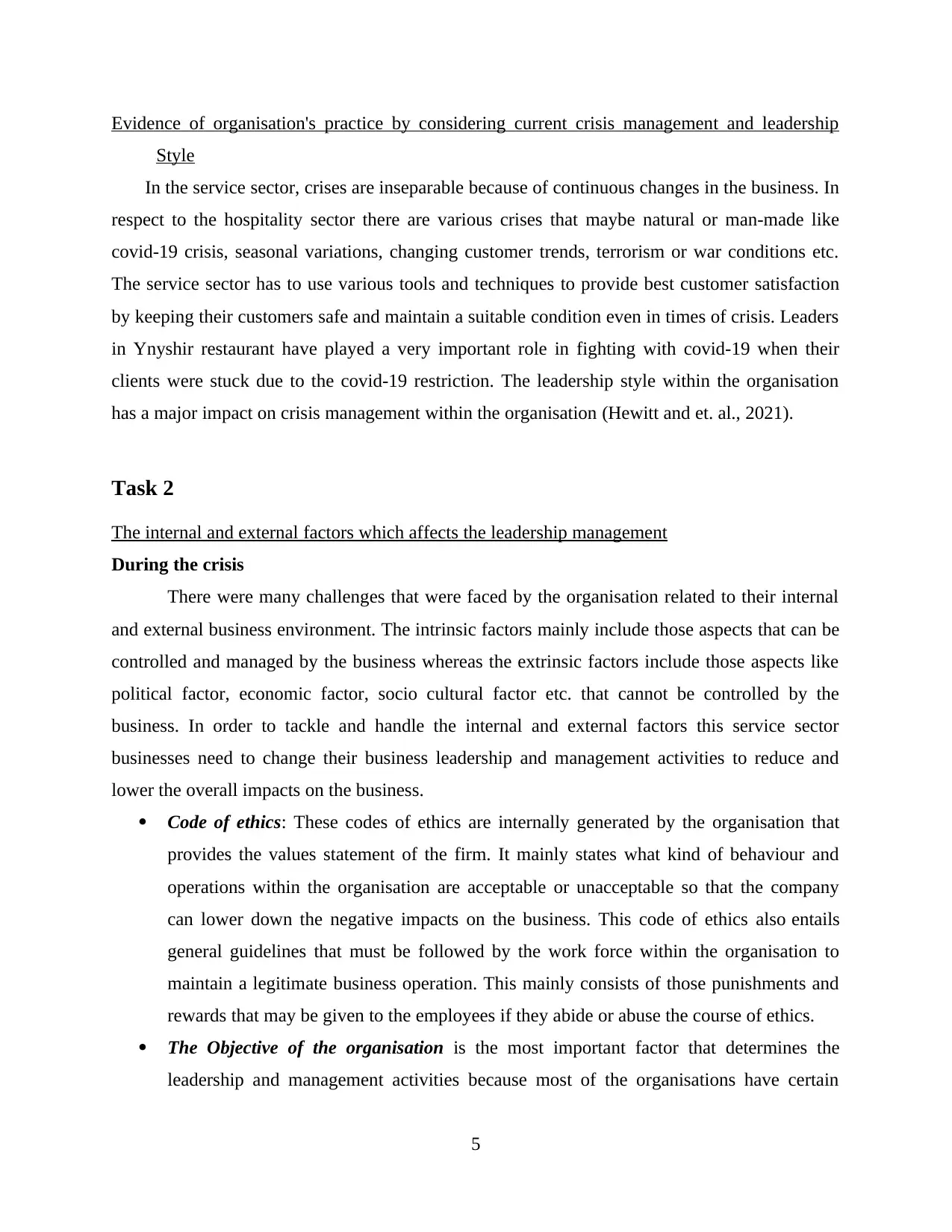
Evidence of organisation's practice by considering current crisis management and leadership
Style
In the service sector, crises are inseparable because of continuous changes in the business. In
respect to the hospitality sector there are various crises that maybe natural or man-made like
covid-19 crisis, seasonal variations, changing customer trends, terrorism or war conditions etc.
The service sector has to use various tools and techniques to provide best customer satisfaction
by keeping their customers safe and maintain a suitable condition even in times of crisis. Leaders
in Ynyshir restaurant have played a very important role in fighting with covid-19 when their
clients were stuck due to the covid-19 restriction. The leadership style within the organisation
has a major impact on crisis management within the organisation (Hewitt and et. al., 2021).
Task 2
The internal and external factors which affects the leadership management
During the crisis
There were many challenges that were faced by the organisation related to their internal
and external business environment. The intrinsic factors mainly include those aspects that can be
controlled and managed by the business whereas the extrinsic factors include those aspects like
political factor, economic factor, socio cultural factor etc. that cannot be controlled by the
business. In order to tackle and handle the internal and external factors this service sector
businesses need to change their business leadership and management activities to reduce and
lower the overall impacts on the business.
Code of ethics: These codes of ethics are internally generated by the organisation that
provides the values statement of the firm. It mainly states what kind of behaviour and
operations within the organisation are acceptable or unacceptable so that the company
can lower down the negative impacts on the business. This code of ethics also entails
general guidelines that must be followed by the work force within the organisation to
maintain a legitimate business operation. This mainly consists of those punishments and
rewards that may be given to the employees if they abide or abuse the course of ethics.
The Objective of the organisation is the most important factor that determines the
leadership and management activities because most of the organisations have certain
5
Style
In the service sector, crises are inseparable because of continuous changes in the business. In
respect to the hospitality sector there are various crises that maybe natural or man-made like
covid-19 crisis, seasonal variations, changing customer trends, terrorism or war conditions etc.
The service sector has to use various tools and techniques to provide best customer satisfaction
by keeping their customers safe and maintain a suitable condition even in times of crisis. Leaders
in Ynyshir restaurant have played a very important role in fighting with covid-19 when their
clients were stuck due to the covid-19 restriction. The leadership style within the organisation
has a major impact on crisis management within the organisation (Hewitt and et. al., 2021).
Task 2
The internal and external factors which affects the leadership management
During the crisis
There were many challenges that were faced by the organisation related to their internal
and external business environment. The intrinsic factors mainly include those aspects that can be
controlled and managed by the business whereas the extrinsic factors include those aspects like
political factor, economic factor, socio cultural factor etc. that cannot be controlled by the
business. In order to tackle and handle the internal and external factors this service sector
businesses need to change their business leadership and management activities to reduce and
lower the overall impacts on the business.
Code of ethics: These codes of ethics are internally generated by the organisation that
provides the values statement of the firm. It mainly states what kind of behaviour and
operations within the organisation are acceptable or unacceptable so that the company
can lower down the negative impacts on the business. This code of ethics also entails
general guidelines that must be followed by the work force within the organisation to
maintain a legitimate business operation. This mainly consists of those punishments and
rewards that may be given to the employees if they abide or abuse the course of ethics.
The Objective of the organisation is the most important factor that determines the
leadership and management activities because most of the organisations have certain
5
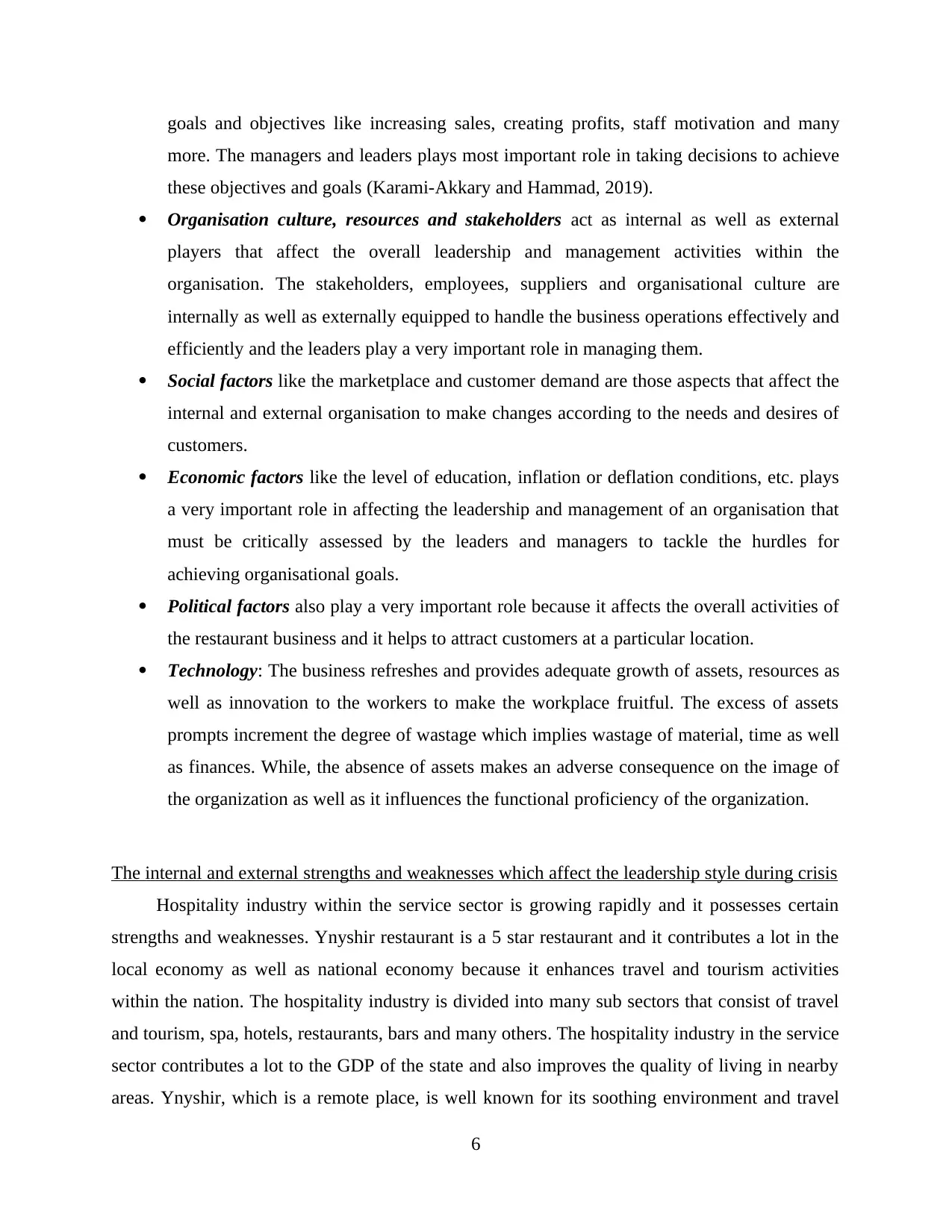
goals and objectives like increasing sales, creating profits, staff motivation and many
more. The managers and leaders plays most important role in taking decisions to achieve
these objectives and goals (Karami-Akkary and Hammad, 2019).
Organisation culture, resources and stakeholders act as internal as well as external
players that affect the overall leadership and management activities within the
organisation. The stakeholders, employees, suppliers and organisational culture are
internally as well as externally equipped to handle the business operations effectively and
efficiently and the leaders play a very important role in managing them.
Social factors like the marketplace and customer demand are those aspects that affect the
internal and external organisation to make changes according to the needs and desires of
customers.
Economic factors like the level of education, inflation or deflation conditions, etc. plays
a very important role in affecting the leadership and management of an organisation that
must be critically assessed by the leaders and managers to tackle the hurdles for
achieving organisational goals.
Political factors also play a very important role because it affects the overall activities of
the restaurant business and it helps to attract customers at a particular location.
Technology: The business refreshes and provides adequate growth of assets, resources as
well as innovation to the workers to make the workplace fruitful. The excess of assets
prompts increment the degree of wastage which implies wastage of material, time as well
as finances. While, the absence of assets makes an adverse consequence on the image of
the organization as well as it influences the functional proficiency of the organization.
The internal and external strengths and weaknesses which affect the leadership style during crisis
Hospitality industry within the service sector is growing rapidly and it possesses certain
strengths and weaknesses. Ynyshir restaurant is a 5 star restaurant and it contributes a lot in the
local economy as well as national economy because it enhances travel and tourism activities
within the nation. The hospitality industry is divided into many sub sectors that consist of travel
and tourism, spa, hotels, restaurants, bars and many others. The hospitality industry in the service
sector contributes a lot to the GDP of the state and also improves the quality of living in nearby
areas. Ynyshir, which is a remote place, is well known for its soothing environment and travel
6
more. The managers and leaders plays most important role in taking decisions to achieve
these objectives and goals (Karami-Akkary and Hammad, 2019).
Organisation culture, resources and stakeholders act as internal as well as external
players that affect the overall leadership and management activities within the
organisation. The stakeholders, employees, suppliers and organisational culture are
internally as well as externally equipped to handle the business operations effectively and
efficiently and the leaders play a very important role in managing them.
Social factors like the marketplace and customer demand are those aspects that affect the
internal and external organisation to make changes according to the needs and desires of
customers.
Economic factors like the level of education, inflation or deflation conditions, etc. plays
a very important role in affecting the leadership and management of an organisation that
must be critically assessed by the leaders and managers to tackle the hurdles for
achieving organisational goals.
Political factors also play a very important role because it affects the overall activities of
the restaurant business and it helps to attract customers at a particular location.
Technology: The business refreshes and provides adequate growth of assets, resources as
well as innovation to the workers to make the workplace fruitful. The excess of assets
prompts increment the degree of wastage which implies wastage of material, time as well
as finances. While, the absence of assets makes an adverse consequence on the image of
the organization as well as it influences the functional proficiency of the organization.
The internal and external strengths and weaknesses which affect the leadership style during crisis
Hospitality industry within the service sector is growing rapidly and it possesses certain
strengths and weaknesses. Ynyshir restaurant is a 5 star restaurant and it contributes a lot in the
local economy as well as national economy because it enhances travel and tourism activities
within the nation. The hospitality industry is divided into many sub sectors that consist of travel
and tourism, spa, hotels, restaurants, bars and many others. The hospitality industry in the service
sector contributes a lot to the GDP of the state and also improves the quality of living in nearby
areas. Ynyshir, which is a remote place, is well known for its soothing environment and travel
6
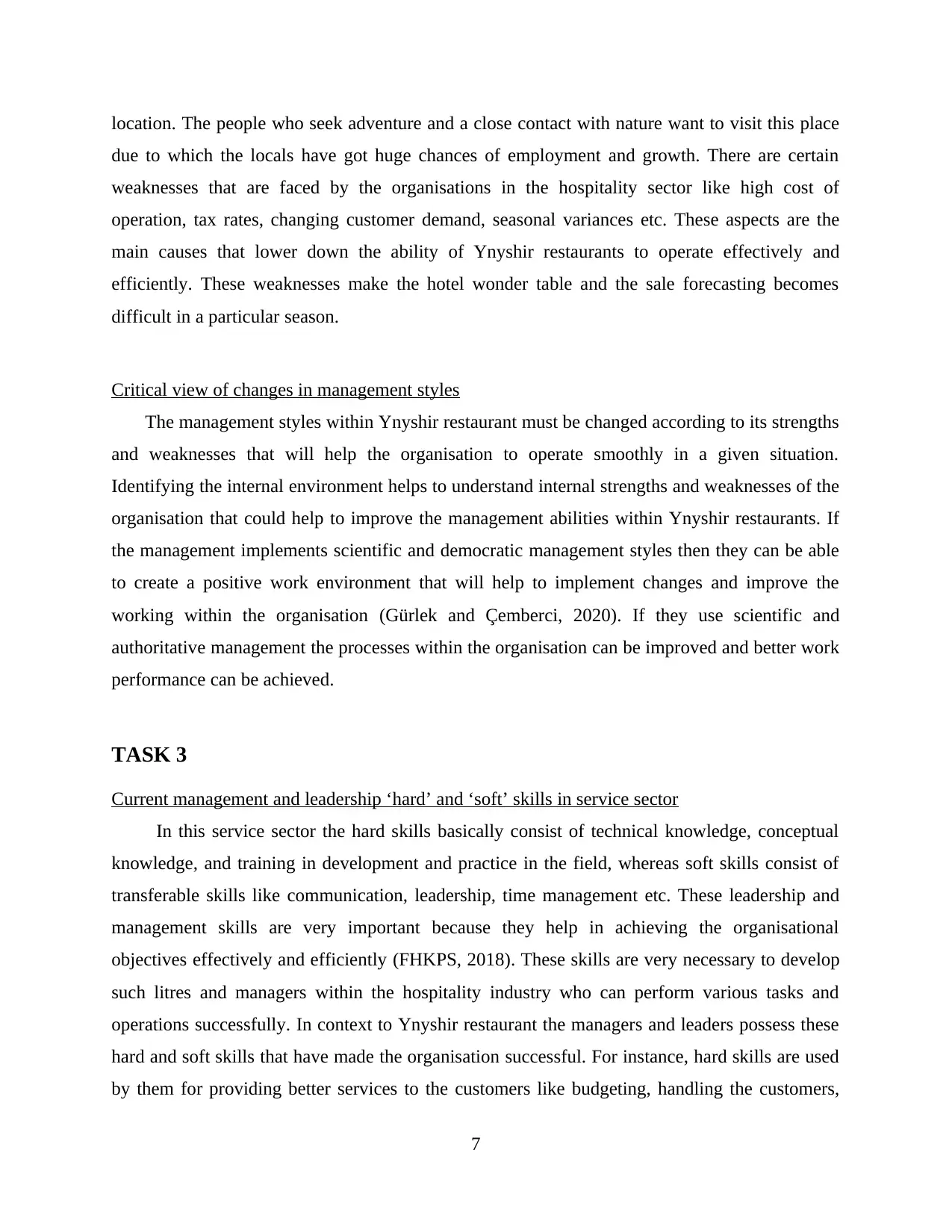
location. The people who seek adventure and a close contact with nature want to visit this place
due to which the locals have got huge chances of employment and growth. There are certain
weaknesses that are faced by the organisations in the hospitality sector like high cost of
operation, tax rates, changing customer demand, seasonal variances etc. These aspects are the
main causes that lower down the ability of Ynyshir restaurants to operate effectively and
efficiently. These weaknesses make the hotel wonder table and the sale forecasting becomes
difficult in a particular season.
Critical view of changes in management styles
The management styles within Ynyshir restaurant must be changed according to its strengths
and weaknesses that will help the organisation to operate smoothly in a given situation.
Identifying the internal environment helps to understand internal strengths and weaknesses of the
organisation that could help to improve the management abilities within Ynyshir restaurants. If
the management implements scientific and democratic management styles then they can be able
to create a positive work environment that will help to implement changes and improve the
working within the organisation (Gürlek and Çemberci, 2020). If they use scientific and
authoritative management the processes within the organisation can be improved and better work
performance can be achieved.
TASK 3
Current management and leadership ‘hard’ and ‘soft’ skills in service sector
In this service sector the hard skills basically consist of technical knowledge, conceptual
knowledge, and training in development and practice in the field, whereas soft skills consist of
transferable skills like communication, leadership, time management etc. These leadership and
management skills are very important because they help in achieving the organisational
objectives effectively and efficiently (FHKPS, 2018). These skills are very necessary to develop
such litres and managers within the hospitality industry who can perform various tasks and
operations successfully. In context to Ynyshir restaurant the managers and leaders possess these
hard and soft skills that have made the organisation successful. For instance, hard skills are used
by them for providing better services to the customers like budgeting, handling the customers,
7
due to which the locals have got huge chances of employment and growth. There are certain
weaknesses that are faced by the organisations in the hospitality sector like high cost of
operation, tax rates, changing customer demand, seasonal variances etc. These aspects are the
main causes that lower down the ability of Ynyshir restaurants to operate effectively and
efficiently. These weaknesses make the hotel wonder table and the sale forecasting becomes
difficult in a particular season.
Critical view of changes in management styles
The management styles within Ynyshir restaurant must be changed according to its strengths
and weaknesses that will help the organisation to operate smoothly in a given situation.
Identifying the internal environment helps to understand internal strengths and weaknesses of the
organisation that could help to improve the management abilities within Ynyshir restaurants. If
the management implements scientific and democratic management styles then they can be able
to create a positive work environment that will help to implement changes and improve the
working within the organisation (Gürlek and Çemberci, 2020). If they use scientific and
authoritative management the processes within the organisation can be improved and better work
performance can be achieved.
TASK 3
Current management and leadership ‘hard’ and ‘soft’ skills in service sector
In this service sector the hard skills basically consist of technical knowledge, conceptual
knowledge, and training in development and practice in the field, whereas soft skills consist of
transferable skills like communication, leadership, time management etc. These leadership and
management skills are very important because they help in achieving the organisational
objectives effectively and efficiently (FHKPS, 2018). These skills are very necessary to develop
such litres and managers within the hospitality industry who can perform various tasks and
operations successfully. In context to Ynyshir restaurant the managers and leaders possess these
hard and soft skills that have made the organisation successful. For instance, hard skills are used
by them for providing better services to the customers like budgeting, handling the customers,
7
Secure Best Marks with AI Grader
Need help grading? Try our AI Grader for instant feedback on your assignments.
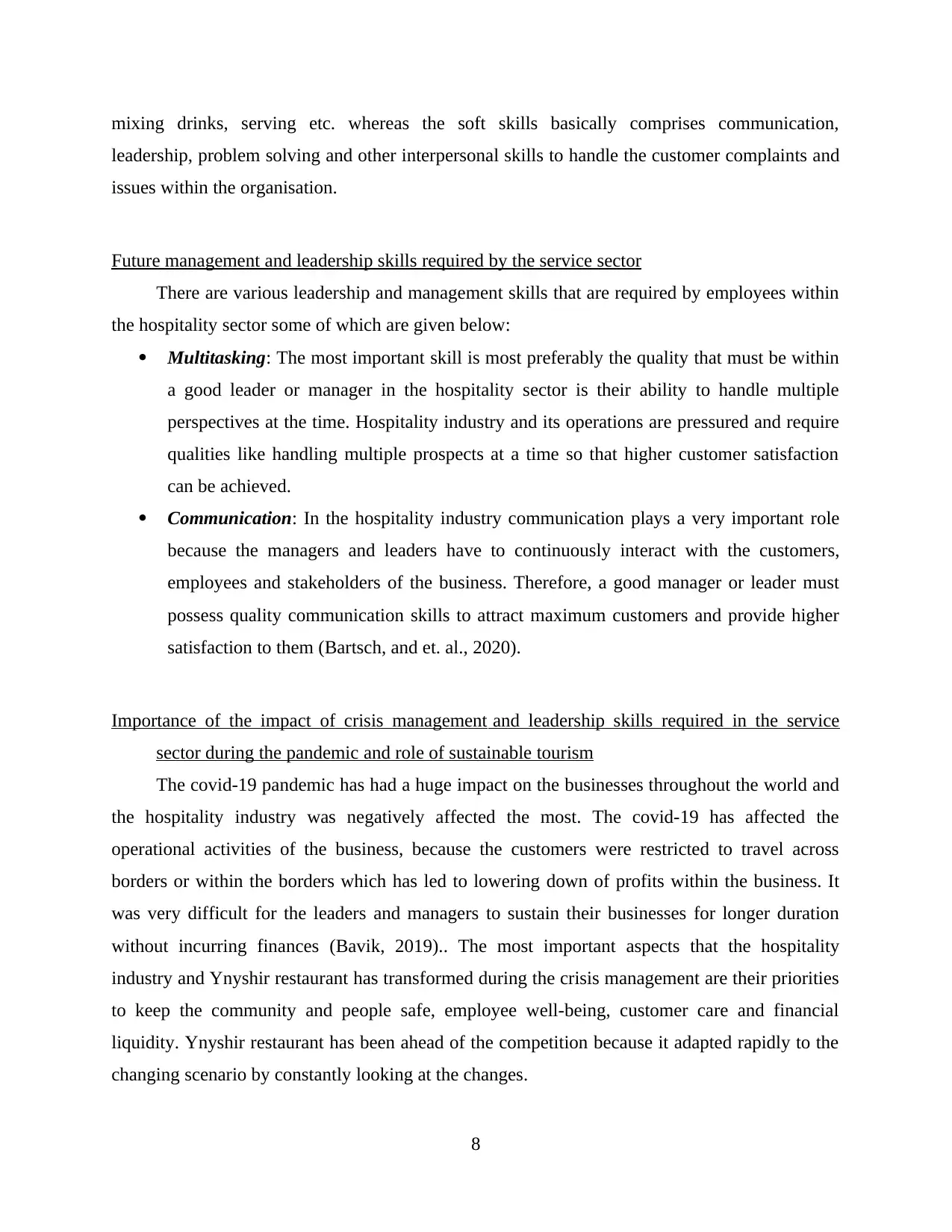
mixing drinks, serving etc. whereas the soft skills basically comprises communication,
leadership, problem solving and other interpersonal skills to handle the customer complaints and
issues within the organisation.
Future management and leadership skills required by the service sector
There are various leadership and management skills that are required by employees within
the hospitality sector some of which are given below:
Multitasking: The most important skill is most preferably the quality that must be within
a good leader or manager in the hospitality sector is their ability to handle multiple
perspectives at the time. Hospitality industry and its operations are pressured and require
qualities like handling multiple prospects at a time so that higher customer satisfaction
can be achieved.
Communication: In the hospitality industry communication plays a very important role
because the managers and leaders have to continuously interact with the customers,
employees and stakeholders of the business. Therefore, a good manager or leader must
possess quality communication skills to attract maximum customers and provide higher
satisfaction to them (Bartsch, and et. al., 2020).
Importance of the impact of crisis management and leadership skills required in the service
sector during the pandemic and role of sustainable tourism
The covid-19 pandemic has had a huge impact on the businesses throughout the world and
the hospitality industry was negatively affected the most. The covid-19 has affected the
operational activities of the business, because the customers were restricted to travel across
borders or within the borders which has led to lowering down of profits within the business. It
was very difficult for the leaders and managers to sustain their businesses for longer duration
without incurring finances (Bavik, 2019).. The most important aspects that the hospitality
industry and Ynyshir restaurant has transformed during the crisis management are their priorities
to keep the community and people safe, employee well-being, customer care and financial
liquidity. Ynyshir restaurant has been ahead of the competition because it adapted rapidly to the
changing scenario by constantly looking at the changes.
8
leadership, problem solving and other interpersonal skills to handle the customer complaints and
issues within the organisation.
Future management and leadership skills required by the service sector
There are various leadership and management skills that are required by employees within
the hospitality sector some of which are given below:
Multitasking: The most important skill is most preferably the quality that must be within
a good leader or manager in the hospitality sector is their ability to handle multiple
perspectives at the time. Hospitality industry and its operations are pressured and require
qualities like handling multiple prospects at a time so that higher customer satisfaction
can be achieved.
Communication: In the hospitality industry communication plays a very important role
because the managers and leaders have to continuously interact with the customers,
employees and stakeholders of the business. Therefore, a good manager or leader must
possess quality communication skills to attract maximum customers and provide higher
satisfaction to them (Bartsch, and et. al., 2020).
Importance of the impact of crisis management and leadership skills required in the service
sector during the pandemic and role of sustainable tourism
The covid-19 pandemic has had a huge impact on the businesses throughout the world and
the hospitality industry was negatively affected the most. The covid-19 has affected the
operational activities of the business, because the customers were restricted to travel across
borders or within the borders which has led to lowering down of profits within the business. It
was very difficult for the leaders and managers to sustain their businesses for longer duration
without incurring finances (Bavik, 2019).. The most important aspects that the hospitality
industry and Ynyshir restaurant has transformed during the crisis management are their priorities
to keep the community and people safe, employee well-being, customer care and financial
liquidity. Ynyshir restaurant has been ahead of the competition because it adapted rapidly to the
changing scenario by constantly looking at the changes.
8
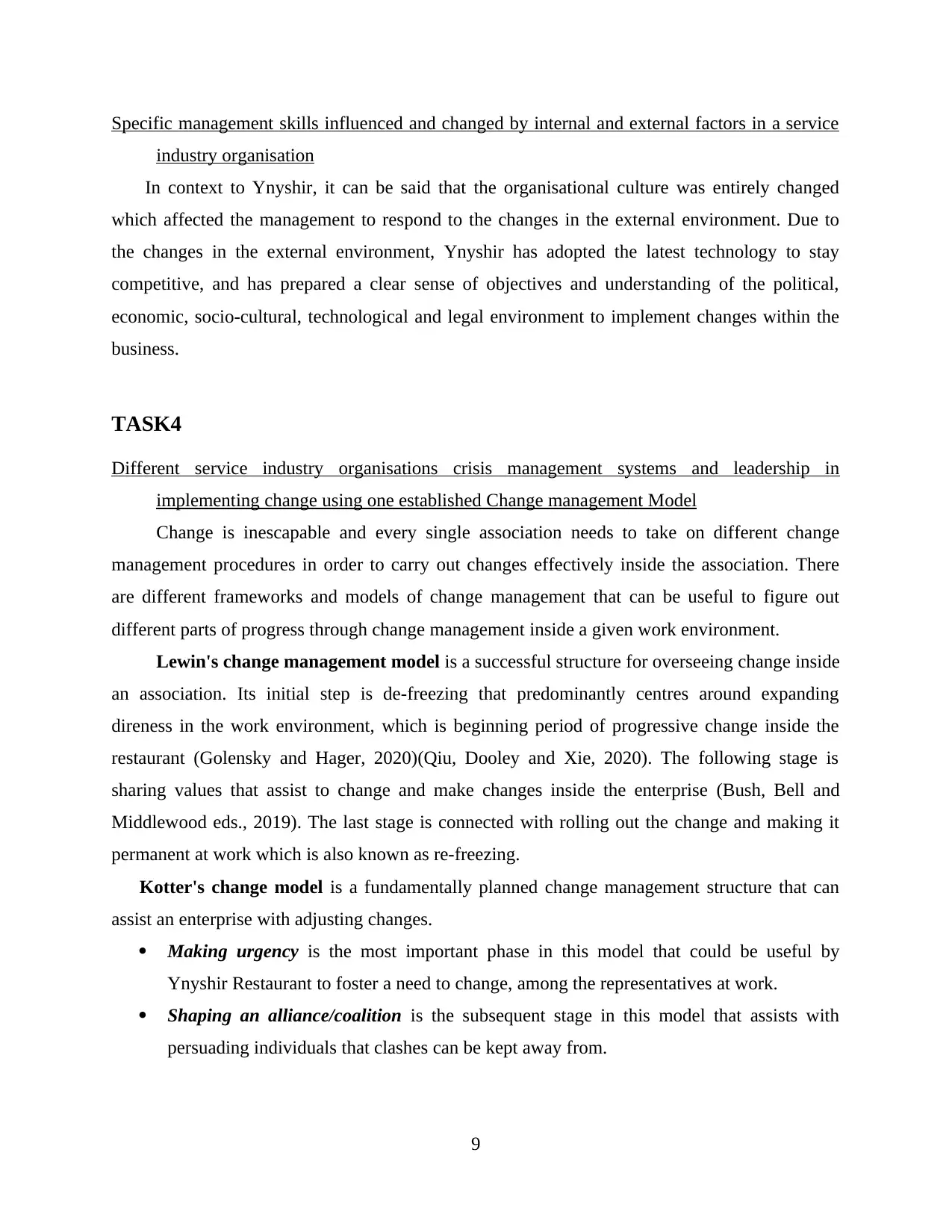
Specific management skills influenced and changed by internal and external factors in a service
industry organisation
In context to Ynyshir, it can be said that the organisational culture was entirely changed
which affected the management to respond to the changes in the external environment. Due to
the changes in the external environment, Ynyshir has adopted the latest technology to stay
competitive, and has prepared a clear sense of objectives and understanding of the political,
economic, socio-cultural, technological and legal environment to implement changes within the
business.
TASK4
Different service industry organisations crisis management systems and leadership in
implementing change using one established Change management Model
Change is inescapable and every single association needs to take on different change
management procedures in order to carry out changes effectively inside the association. There
are different frameworks and models of change management that can be useful to figure out
different parts of progress through change management inside a given work environment.
Lewin's change management model is a successful structure for overseeing change inside
an association. Its initial step is de-freezing that predominantly centres around expanding
direness in the work environment, which is beginning period of progressive change inside the
restaurant (Golensky and Hager, 2020)(Qiu, Dooley and Xie, 2020). The following stage is
sharing values that assist to change and make changes inside the enterprise (Bush, Bell and
Middlewood eds., 2019). The last stage is connected with rolling out the change and making it
permanent at work which is also known as re-freezing.
Kotter's change model is a fundamentally planned change management structure that can
assist an enterprise with adjusting changes.
Making urgency is the most important phase in this model that could be useful by
Ynyshir Restaurant to foster a need to change, among the representatives at work.
Shaping an alliance/coalition is the subsequent stage in this model that assists with
persuading individuals that clashes can be kept away from.
9
industry organisation
In context to Ynyshir, it can be said that the organisational culture was entirely changed
which affected the management to respond to the changes in the external environment. Due to
the changes in the external environment, Ynyshir has adopted the latest technology to stay
competitive, and has prepared a clear sense of objectives and understanding of the political,
economic, socio-cultural, technological and legal environment to implement changes within the
business.
TASK4
Different service industry organisations crisis management systems and leadership in
implementing change using one established Change management Model
Change is inescapable and every single association needs to take on different change
management procedures in order to carry out changes effectively inside the association. There
are different frameworks and models of change management that can be useful to figure out
different parts of progress through change management inside a given work environment.
Lewin's change management model is a successful structure for overseeing change inside
an association. Its initial step is de-freezing that predominantly centres around expanding
direness in the work environment, which is beginning period of progressive change inside the
restaurant (Golensky and Hager, 2020)(Qiu, Dooley and Xie, 2020). The following stage is
sharing values that assist to change and make changes inside the enterprise (Bush, Bell and
Middlewood eds., 2019). The last stage is connected with rolling out the change and making it
permanent at work which is also known as re-freezing.
Kotter's change model is a fundamentally planned change management structure that can
assist an enterprise with adjusting changes.
Making urgency is the most important phase in this model that could be useful by
Ynyshir Restaurant to foster a need to change, among the representatives at work.
Shaping an alliance/coalition is the subsequent stage in this model that assists with
persuading individuals that clashes can be kept away from.
9
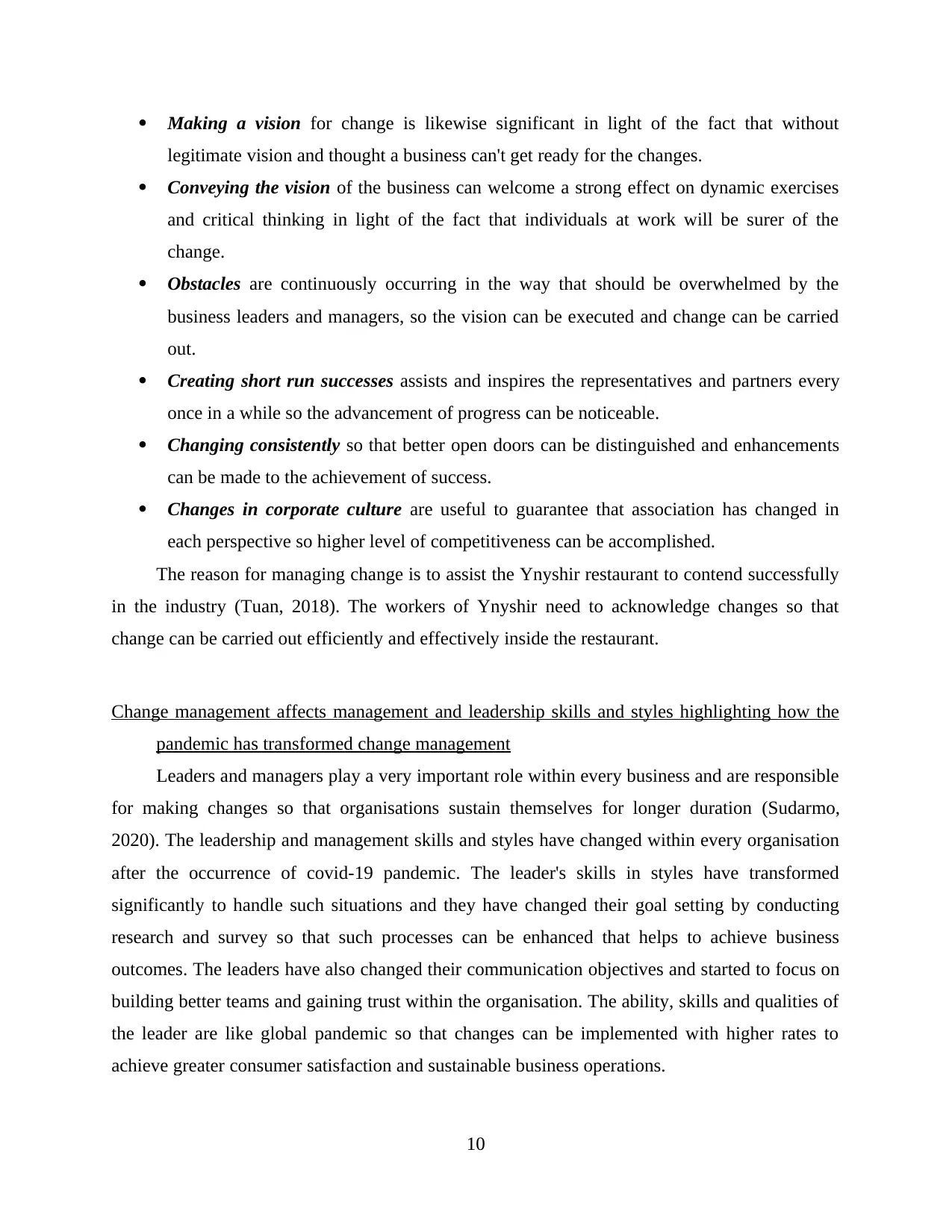
Making a vision for change is likewise significant in light of the fact that without
legitimate vision and thought a business can't get ready for the changes.
Conveying the vision of the business can welcome a strong effect on dynamic exercises
and critical thinking in light of the fact that individuals at work will be surer of the
change.
Obstacles are continuously occurring in the way that should be overwhelmed by the
business leaders and managers, so the vision can be executed and change can be carried
out.
Creating short run successes assists and inspires the representatives and partners every
once in a while so the advancement of progress can be noticeable.
Changing consistently so that better open doors can be distinguished and enhancements
can be made to the achievement of success.
Changes in corporate culture are useful to guarantee that association has changed in
each perspective so higher level of competitiveness can be accomplished.
The reason for managing change is to assist the Ynyshir restaurant to contend successfully
in the industry (Tuan, 2018). The workers of Ynyshir need to acknowledge changes so that
change can be carried out efficiently and effectively inside the restaurant.
Change management affects management and leadership skills and styles highlighting how the
pandemic has transformed change management
Leaders and managers play a very important role within every business and are responsible
for making changes so that organisations sustain themselves for longer duration (Sudarmo,
2020). The leadership and management skills and styles have changed within every organisation
after the occurrence of covid-19 pandemic. The leader's skills in styles have transformed
significantly to handle such situations and they have changed their goal setting by conducting
research and survey so that such processes can be enhanced that helps to achieve business
outcomes. The leaders have also changed their communication objectives and started to focus on
building better teams and gaining trust within the organisation. The ability, skills and qualities of
the leader are like global pandemic so that changes can be implemented with higher rates to
achieve greater consumer satisfaction and sustainable business operations.
10
legitimate vision and thought a business can't get ready for the changes.
Conveying the vision of the business can welcome a strong effect on dynamic exercises
and critical thinking in light of the fact that individuals at work will be surer of the
change.
Obstacles are continuously occurring in the way that should be overwhelmed by the
business leaders and managers, so the vision can be executed and change can be carried
out.
Creating short run successes assists and inspires the representatives and partners every
once in a while so the advancement of progress can be noticeable.
Changing consistently so that better open doors can be distinguished and enhancements
can be made to the achievement of success.
Changes in corporate culture are useful to guarantee that association has changed in
each perspective so higher level of competitiveness can be accomplished.
The reason for managing change is to assist the Ynyshir restaurant to contend successfully
in the industry (Tuan, 2018). The workers of Ynyshir need to acknowledge changes so that
change can be carried out efficiently and effectively inside the restaurant.
Change management affects management and leadership skills and styles highlighting how the
pandemic has transformed change management
Leaders and managers play a very important role within every business and are responsible
for making changes so that organisations sustain themselves for longer duration (Sudarmo,
2020). The leadership and management skills and styles have changed within every organisation
after the occurrence of covid-19 pandemic. The leader's skills in styles have transformed
significantly to handle such situations and they have changed their goal setting by conducting
research and survey so that such processes can be enhanced that helps to achieve business
outcomes. The leaders have also changed their communication objectives and started to focus on
building better teams and gaining trust within the organisation. The ability, skills and qualities of
the leader are like global pandemic so that changes can be implemented with higher rates to
achieve greater consumer satisfaction and sustainable business operations.
10
Paraphrase This Document
Need a fresh take? Get an instant paraphrase of this document with our AI Paraphraser
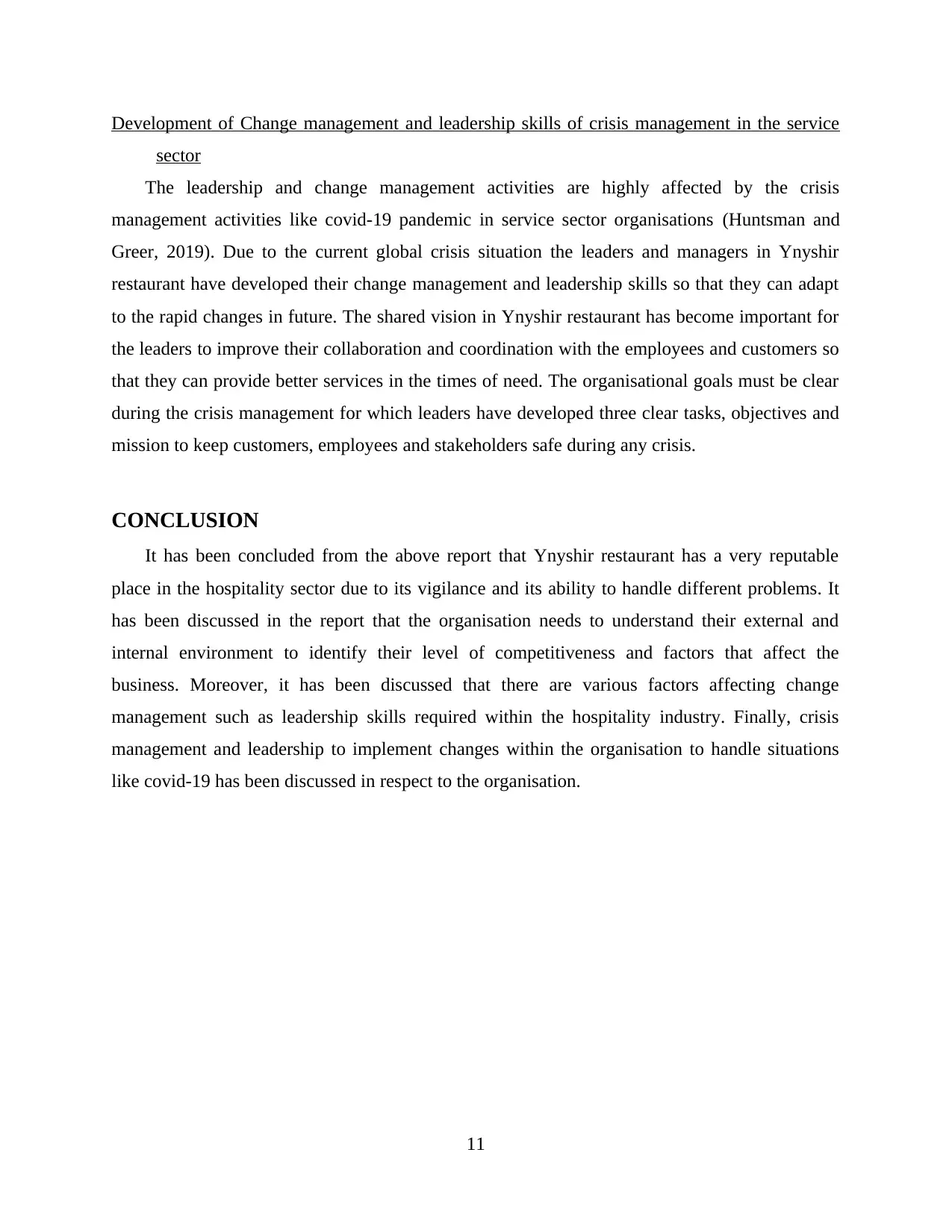
Development of Change management and leadership skills of crisis management in the service
sector
The leadership and change management activities are highly affected by the crisis
management activities like covid-19 pandemic in service sector organisations (Huntsman and
Greer, 2019). Due to the current global crisis situation the leaders and managers in Ynyshir
restaurant have developed their change management and leadership skills so that they can adapt
to the rapid changes in future. The shared vision in Ynyshir restaurant has become important for
the leaders to improve their collaboration and coordination with the employees and customers so
that they can provide better services in the times of need. The organisational goals must be clear
during the crisis management for which leaders have developed three clear tasks, objectives and
mission to keep customers, employees and stakeholders safe during any crisis.
CONCLUSION
It has been concluded from the above report that Ynyshir restaurant has a very reputable
place in the hospitality sector due to its vigilance and its ability to handle different problems. It
has been discussed in the report that the organisation needs to understand their external and
internal environment to identify their level of competitiveness and factors that affect the
business. Moreover, it has been discussed that there are various factors affecting change
management such as leadership skills required within the hospitality industry. Finally, crisis
management and leadership to implement changes within the organisation to handle situations
like covid-19 has been discussed in respect to the organisation.
11
sector
The leadership and change management activities are highly affected by the crisis
management activities like covid-19 pandemic in service sector organisations (Huntsman and
Greer, 2019). Due to the current global crisis situation the leaders and managers in Ynyshir
restaurant have developed their change management and leadership skills so that they can adapt
to the rapid changes in future. The shared vision in Ynyshir restaurant has become important for
the leaders to improve their collaboration and coordination with the employees and customers so
that they can provide better services in the times of need. The organisational goals must be clear
during the crisis management for which leaders have developed three clear tasks, objectives and
mission to keep customers, employees and stakeholders safe during any crisis.
CONCLUSION
It has been concluded from the above report that Ynyshir restaurant has a very reputable
place in the hospitality sector due to its vigilance and its ability to handle different problems. It
has been discussed in the report that the organisation needs to understand their external and
internal environment to identify their level of competitiveness and factors that affect the
business. Moreover, it has been discussed that there are various factors affecting change
management such as leadership skills required within the hospitality industry. Finally, crisis
management and leadership to implement changes within the organisation to handle situations
like covid-19 has been discussed in respect to the organisation.
11
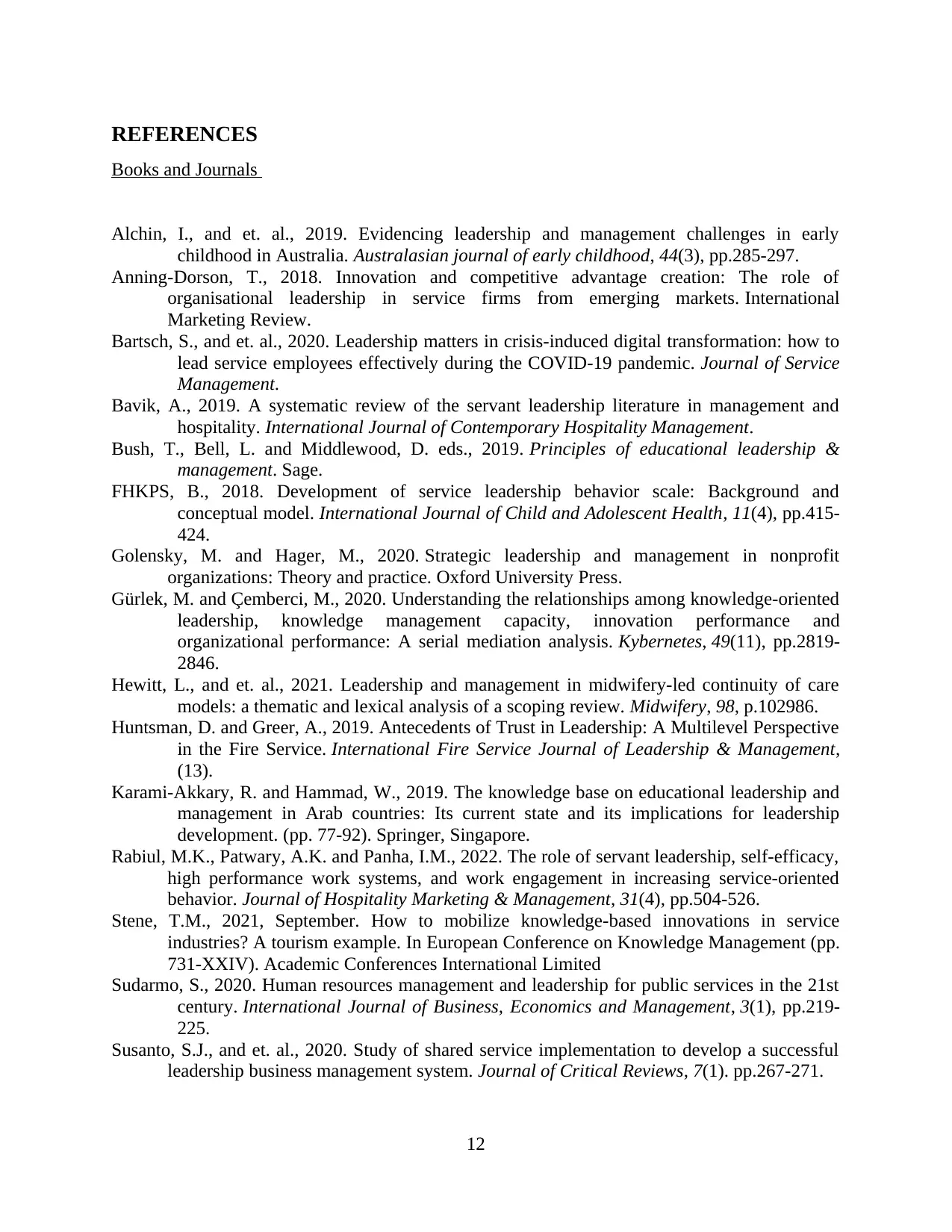
REFERENCES
Books and Journals
Alchin, I., and et. al., 2019. Evidencing leadership and management challenges in early
childhood in Australia. Australasian journal of early childhood, 44(3), pp.285-297.
Anning-Dorson, T., 2018. Innovation and competitive advantage creation: The role of
organisational leadership in service firms from emerging markets. International
Marketing Review.
Bartsch, S., and et. al., 2020. Leadership matters in crisis-induced digital transformation: how to
lead service employees effectively during the COVID-19 pandemic. Journal of Service
Management.
Bavik, A., 2019. A systematic review of the servant leadership literature in management and
hospitality. International Journal of Contemporary Hospitality Management.
Bush, T., Bell, L. and Middlewood, D. eds., 2019. Principles of educational leadership &
management. Sage.
FHKPS, B., 2018. Development of service leadership behavior scale: Background and
conceptual model. International Journal of Child and Adolescent Health, 11(4), pp.415-
424.
Golensky, M. and Hager, M., 2020. Strategic leadership and management in nonprofit
organizations: Theory and practice. Oxford University Press.
Gürlek, M. and Çemberci, M., 2020. Understanding the relationships among knowledge-oriented
leadership, knowledge management capacity, innovation performance and
organizational performance: A serial mediation analysis. Kybernetes, 49(11), pp.2819-
2846.
Hewitt, L., and et. al., 2021. Leadership and management in midwifery-led continuity of care
models: a thematic and lexical analysis of a scoping review. Midwifery, 98, p.102986.
Huntsman, D. and Greer, A., 2019. Antecedents of Trust in Leadership: A Multilevel Perspective
in the Fire Service. International Fire Service Journal of Leadership & Management,
(13).
Karami-Akkary, R. and Hammad, W., 2019. The knowledge base on educational leadership and
management in Arab countries: Its current state and its implications for leadership
development. (pp. 77-92). Springer, Singapore.
Rabiul, M.K., Patwary, A.K. and Panha, I.M., 2022. The role of servant leadership, self-efficacy,
high performance work systems, and work engagement in increasing service-oriented
behavior. Journal of Hospitality Marketing & Management, 31(4), pp.504-526.
Stene, T.M., 2021, September. How to mobilize knowledge-based innovations in service
industries? A tourism example. In European Conference on Knowledge Management (pp.
731-XXIV). Academic Conferences International Limited
Sudarmo, S., 2020. Human resources management and leadership for public services in the 21st
century. International Journal of Business, Economics and Management, 3(1), pp.219-
225.
Susanto, S.J., and et. al., 2020. Study of shared service implementation to develop a successful
leadership business management system. Journal of Critical Reviews, 7(1). pp.267-271.
12
Books and Journals
Alchin, I., and et. al., 2019. Evidencing leadership and management challenges in early
childhood in Australia. Australasian journal of early childhood, 44(3), pp.285-297.
Anning-Dorson, T., 2018. Innovation and competitive advantage creation: The role of
organisational leadership in service firms from emerging markets. International
Marketing Review.
Bartsch, S., and et. al., 2020. Leadership matters in crisis-induced digital transformation: how to
lead service employees effectively during the COVID-19 pandemic. Journal of Service
Management.
Bavik, A., 2019. A systematic review of the servant leadership literature in management and
hospitality. International Journal of Contemporary Hospitality Management.
Bush, T., Bell, L. and Middlewood, D. eds., 2019. Principles of educational leadership &
management. Sage.
FHKPS, B., 2018. Development of service leadership behavior scale: Background and
conceptual model. International Journal of Child and Adolescent Health, 11(4), pp.415-
424.
Golensky, M. and Hager, M., 2020. Strategic leadership and management in nonprofit
organizations: Theory and practice. Oxford University Press.
Gürlek, M. and Çemberci, M., 2020. Understanding the relationships among knowledge-oriented
leadership, knowledge management capacity, innovation performance and
organizational performance: A serial mediation analysis. Kybernetes, 49(11), pp.2819-
2846.
Hewitt, L., and et. al., 2021. Leadership and management in midwifery-led continuity of care
models: a thematic and lexical analysis of a scoping review. Midwifery, 98, p.102986.
Huntsman, D. and Greer, A., 2019. Antecedents of Trust in Leadership: A Multilevel Perspective
in the Fire Service. International Fire Service Journal of Leadership & Management,
(13).
Karami-Akkary, R. and Hammad, W., 2019. The knowledge base on educational leadership and
management in Arab countries: Its current state and its implications for leadership
development. (pp. 77-92). Springer, Singapore.
Rabiul, M.K., Patwary, A.K. and Panha, I.M., 2022. The role of servant leadership, self-efficacy,
high performance work systems, and work engagement in increasing service-oriented
behavior. Journal of Hospitality Marketing & Management, 31(4), pp.504-526.
Stene, T.M., 2021, September. How to mobilize knowledge-based innovations in service
industries? A tourism example. In European Conference on Knowledge Management (pp.
731-XXIV). Academic Conferences International Limited
Sudarmo, S., 2020. Human resources management and leadership for public services in the 21st
century. International Journal of Business, Economics and Management, 3(1), pp.219-
225.
Susanto, S.J., and et. al., 2020. Study of shared service implementation to develop a successful
leadership business management system. Journal of Critical Reviews, 7(1). pp.267-271.
12
1 out of 15
Related Documents
Your All-in-One AI-Powered Toolkit for Academic Success.
+13062052269
info@desklib.com
Available 24*7 on WhatsApp / Email
![[object Object]](/_next/static/media/star-bottom.7253800d.svg)
Unlock your academic potential
© 2024 | Zucol Services PVT LTD | All rights reserved.